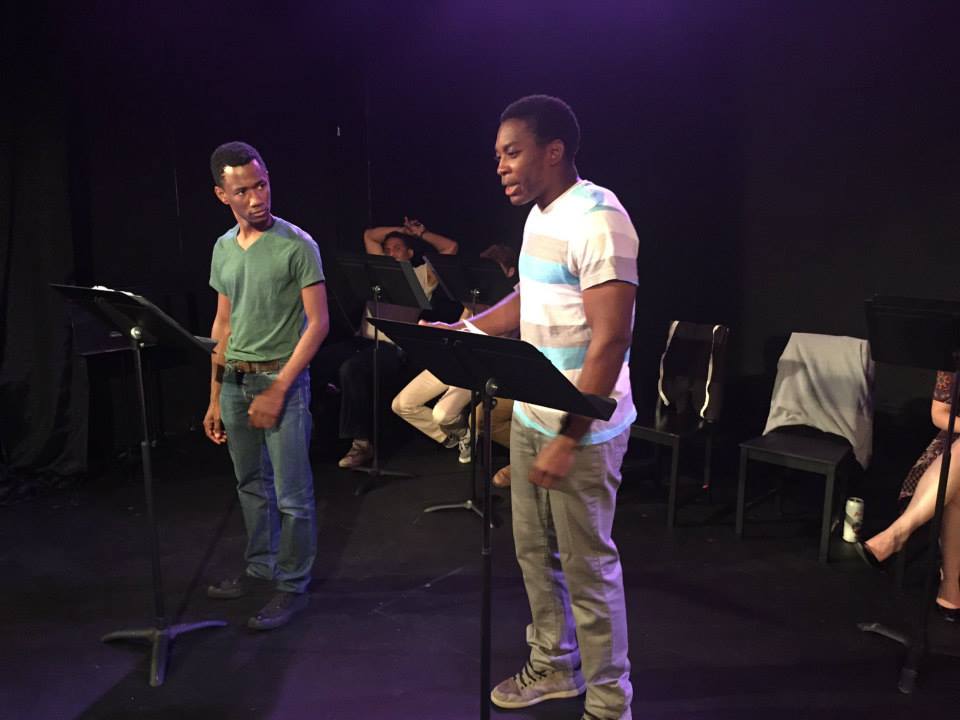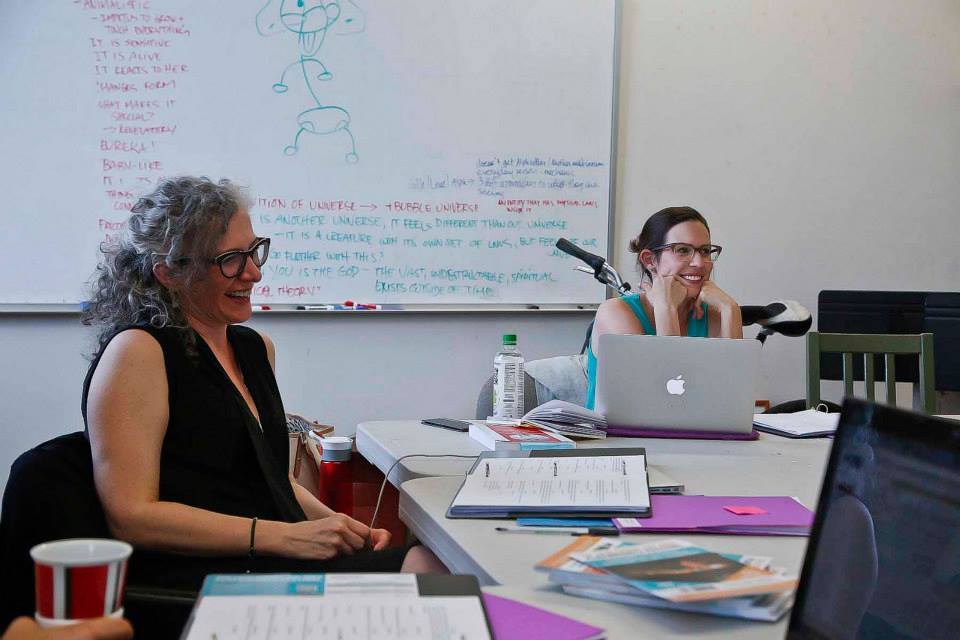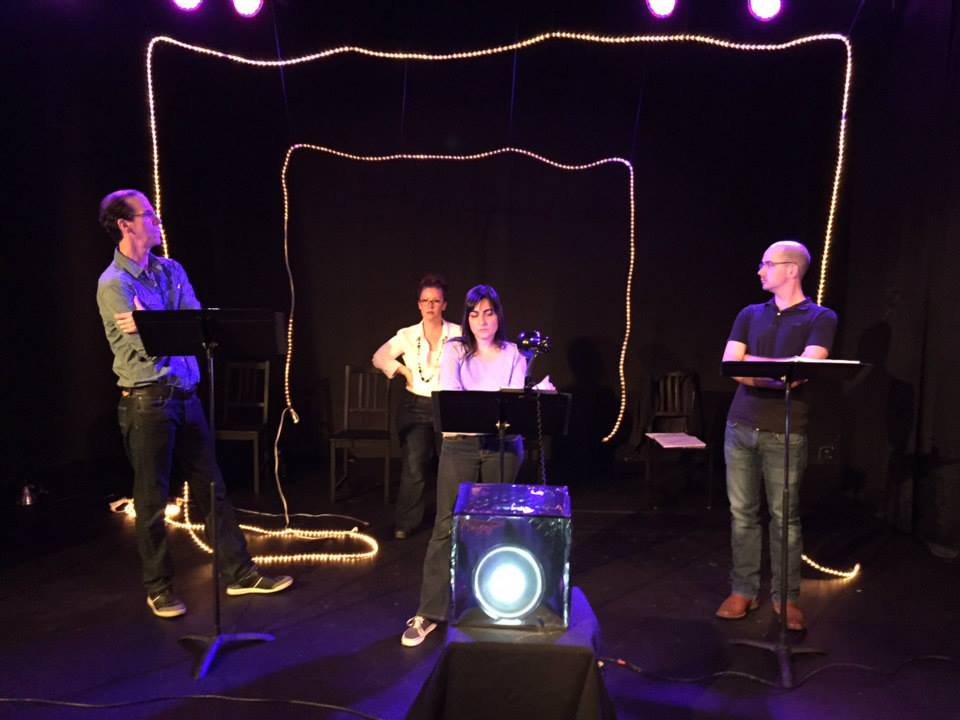SAN FRANCISCO: At the beginning of Tearrance Chisholm’s Hooded, or Being Black for Dummies at the Bay Area Playwrights Festival, an actor with a police badge (Myers Clark) tells us to take out our cell phone and “please turn your ringer to its highest volume.”
“This story is unimportant,” he continues. “So if your phone rings, answer it.” He points out a “laugh” light, instructing the audience to laugh when it turns on—and only when it turns on. “Laughing when the laugh light is off makes you a racist.”
It’s a provocative opening to a provocative play. Hooded focuses on two teenage boys who meet in jail, both arrested for being black in the wrong place at the wrong time. Marquis (Eddie Jackson) is a suburban kid raised by white parents, and he was caught “Trayvoning”—a disturbing real-life meme in which predominantly white kids pose for photos lying face-down on the ground in a hoodie while holding a pack of Skittles and a can of Arizona Iced Tea. Tru (Giovanni Adams), an impish and charismatic kid from Baltimore, offers to coach the uptight Marquis how to act more “black,” leading to a devastatingly disturbing and grimly funny look at the endless microaggressions that make up everyday racism in American society.
Even in a staged-reading format, directed by Jessa Brie Moreno with a terrific cast of Bay Area actors, it’s an immensely powerful and electrifyingly original work that can’t help but dredge up a lot of difficult emotions and associations in the audience. In a talkback afterward a recent BAPF reading, it seemed like everyone in the audience was eager to weigh in on “the perceived continuum of blackness,” as one observer put it, while dramaturg Lisa Marie Rollins deftly steered opinions and suggestions back into questions.
A variety of responses on a thorny subject like this is par for the course, as Chisholm attested afterward.
“I’ve had some really weird interactions,” he admitted. “When you bring up race, it opens up the conversation and people feel a little more at liberty to say what they think. Sometimes the things that they think are pretty bad. Trying to figure out how to approach that, and how to go back and address that somehow in the work, is sort of difficult. ”
On the whole, Chisholm said, he found the spirited conversation gratifying. “There was a young woman who spoke up about how disturbing some of the images were because she saw people she knew and parts of herself in it. That was a beautiful moment, because she was open and vulnerable.”
Hooded was the second of three plays performed last Sat., July 18, on the second day of the 38th annual festival, which is produced by Playwrights Foundation. It runs through July 26 at Tides Theatre. Earlier that afternoon was On a Wonderverse, Geetha Reddy’s play about a routinely overlooked female physicist who creates a miniature universe in her lab; and later that evening was Welcome to Fear City, Kara Lee Corthron’s look at the birth of hip-hop in the Bronx in the 1970s.

On Friday, the festival had kicked off with The Revolutionists, Lauren Gunderson’s feminist comedy about four real-life women trying to literally keep their heads during the French Revolution. Sunday continued with Galilee, Christine Evans’s play about the environmental devastation of the Great Barrier Reef; Read to Me, Brendan Pelsue’s drama about a terminally ill boy writing letters to strangers; and #julys by Sam Lahne, about a neglected Jewish boy anonymously starting an anti-Semitic conspiracy website.
After a frenzied week of rewrites and rehearsals based on the reactions from that first round of readings, those same seven plays will be performed again in staged readings this coming weekend, with various workshops and panels in between.
“What I love most is the time—that it’s spread out the way it is,” Gunderson said of the process. “Having an intense week of rehearsal and a reading, and then another week of rehearsal and another reading, I really think is the closest thing to a rehearsal for a production that you can get with a reading.”
For her that’s especially helpful, because The Revolutionists is slated for a premiere at Cincinnati Playhouse in the Park early next year. This gives Gunderson some extra time to work on the script and see how audiences react, before she sends the script to Ohio. “The format of this festival allows me to do a lot of experimentation. I rewrote the first 10 pages a couple of times already, and we’re going to try something totally new this week.”
The Revolutionists is a terribly funny comedy bursting with clever quips; Marie Antoinette is a character in it, and pretty much everything she says is priceless. But the play’s nonstop humor is actually one of the concerns Gunderson is currently grappling with.
“It’s an odd tone, because it’s a play about the French Revolution,” she said. “A lot of characters may or may not lose their heads to the guillotine. But it’s a comedy that’s also this self-referential exploration of theatre’s purpose as an activist tool; it’s feminist; it’s all kinds of strange stuff. I’m a glutton for jokes, but in this play you can have too many. So we’re trying to figure out when to say, ‘I think they’ve laughed enough, let’s move on.’”
The two weeks of staged readings are, of course, only the public face of a much lengthier process of work on the plays.
“Once we decide which plays we’re going to work on, we connect with the writers, we talk about what their goals are for the festival, and really try to focus on what the playwrights really need to push their plays to the next logical step in the plays’ development,” said Amy Mueller, Playwrights Foundation’s artistic director for the last 15 years. “For some people, that means a complete rewrite, and for other people it’s a polish. Some people are looking forward to productions they already have booked, and other people are really interested in getting their plays to a point where they feel comfortable submitting them, or they want to actually attract a producer to the work. Everybody’s got different goals.”
Mueller said she also takes care to match playwrights with directors and dramaturgs, usually from the Bay Area’s robust talent pool, as well sharp casts of local actors to bring the plays to life.
The gathering begins with a retreat where the directors and dramaturgs come together and listen to the playwrights read their own plays aloud. “I read my entire play, all the parts, which is harrowing and really fun,” Gunderson says.

Both the festival and Playwrights Foundation itself were founded in 1976 by Robert Woodruff, a cofounder of San Francisco’s Eureka Theatre, who would go on to become an acclaimed director nationally and internationally, eventually serving for five years as artistic director of American Repertory Theater.
“The story he tells is that he couldn’t get a call back from ACT or Magic Theatre, and he knew all these interesting young writers and he wanted to work with them as a director,” Mueller said. “So he decided: Screw it, I’m just going to start my own thing. That’s how it got started, and back in the day they were full productions. They would meet out in the Marin Headlands for a couple of weeks, the plays were created over the summer, and then they would produce them.”
The very first Bay Area Playwrights Festival included a play by Sam Shepard, who returned to the festival in 1983. Woodruff would later direct the world premieres of Shepard’s seminal works Buried Child and True West at the Magic.
Some time after Woodruff left in 1984, the format of the festival changed. Other new play festivals that had arisen around the country were using the staged-reading format, Mueller noted, “and Playwrights Foundation, due to budgetary constraints, took on that format.”
The list of playwrights who have developed work through the festival over the years is staggering, including Nilo Cruz, Annie Baker, Anna Deavere Smith, David Henry Hwang, Holly Hughes, Naomi Iizuka, Katori Hall, Philip Kan Gotanda, Mac Wellman, Anthony Clarvoe, Romulus Linney, María Irene Fornés, Erin Cressida Wilson, Brenda Wong Aoki, Bill “Reverend Billy” Talen, Marcus Gardley, Liz Duffy Adams, and Samuel D. Hunter—as well as many others currently emerging as forces to be reckoned with. Indeed, most of the names above weren’t well-known when their work appeared at BAPF, and discovering the next major writers is precisely what the festival is about.
In selecting plays for the festival, Mueller said she always aims for a mix of national and local playwrights. “We will never, ever do a festival with less than two local writers,” she said. Of the three playwrights returning to the festival this year after participating in past fests, two are local—in fact, San Francisco’s Gunderson and Burlingame resident Geetha Reddy are both resident playwrights with Playwrights Foundation. The third returnee is Australian-born playwright Christine Evans, who isn’t based in the Bay Area but has strong ties to the local theatre scene.
Other playwrights this year aren’t just new to the festival; they’re pretty new all around. “We always include at least one emerging writer, and the way we define that is a writer who is either in a graduate or undergraduate playwriting program or is within a year and a half of having graduated from a program,” Mueller said. “This year, very unusually, three of the writers are still in graduate school.”
Those three are also, coincidentally, all the male writers this year: Chisholm, who is at the Catholic University of America in Washington, D.C.; Sam Lahne, at University of Iowa; and Brendan Pelsue, at Yale School of Drama.
The seven BAPF plays were selected from more than 500 submissions. Reddy’s play had already been selected outside the BAPF process as part of a producing partnership with San Francisco’s Crowded Fire Theater. Like Christopher Chen’s Glickman Award-winning play The Hundred Flowers Project in 2012, On a Wonderverse is a co-commission of Crowded Fire and Playwrights Foundation set to premiere some time next year. (Originally scheduled to close out Crowded Fire’s season this fall, On a Wonderverse has been pushed back to the company’s next season due to some scheduling issues among the creative team, at a time when Crowded Fire was already occupied with hiring a new artistic director.)
In addition to working out the usual assortment of tics in the script, the festival is taking the unusual step in the case of Reddy’s play of trying out some design elements intended to represent the creation of an artificial universe onstage.
“I had the idea that the universe itself would be kind of a character in the play, and we’ve always just read the stage directions for it,” Reddy said. “But getting a chance to see some of the design elements incorporated, and seeing how it affects the relationships with the actors onstage and adjusting the play accordingly, has been a really important part of the last week of work on the play.”
Another departure from previous years: Seven plays is one more play than usual.
“This year we had a little extra money, and we fell in love with the other six plays,” Mueller explained of adding them to mix with the already agreed-upon On a Wonderverse. “We felt they complemented each other in a really interesting way and they were very different from each other. We looked at the needs of each of the plays, we looked at the number of actors that were going to be necessary, and realized that it was not going to cost us that much extra money to add a seventh play this year. We decided to go for it.”
After many years at Thick House in the relatively remote Potrero Hill neighborhood, this year BAPF has moved to Tides Theatre in the heart of the Union Square theatre district, which is the former home of San Francisco Playhouse and the recently announced future digs of Custom Made Theatre Co.
Mueller said she’s excited to see how the more central location may aid in the important work of getting these new plays seen. As high-profile as the festival is in the new-play development world, it’s easy for a staged-reading festival to fly under the radar of theatregoers. As Gunderson put it, “As a local, you kind of forget that this incredible thing is in your backyard.”
Judging from the packed houses at Tides for the first few readings this year, however, BAPF is doing a good job of getting the word out to those still thirsty for new work in a city that’s bursting with it.
A freelance theatre critic for KQED Arts, the Marin Independent Journal and the San Jose Mercury News, Sam Hurwitt blogs at The Idiolect and is currently writing a Medea play for the San Francisco Olympians Festival.


